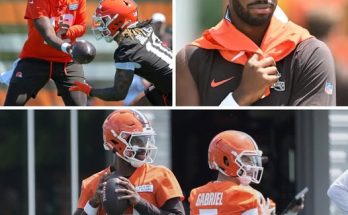Troy Franklin, the rising star of the Denver Broncos, has made a significant move that has fans talking. The wide receiver, who joined the Broncos after an impressive college career at the University of Oregon, has made the decision to switch back to his former jersey number, the number that was synonymous with his glory days as a Duck. The number change has sent waves of excitement through the Denver Broncos’ fanbase and the larger college football community, as it represents not just a return to Franklin’s roots but also a signal of the young player’s continued evolution in the professional ranks.
Franklin, a standout at Oregon, wore the number 11 jersey during his time with the Ducks, where he quickly became one of the most promising wide receivers in college football. His combination of speed, agility, and hands made him a key playmaker for Oregon, and he was widely recognized for his contributions to the team’s offensive success. Franklin’s decision to wear number 11 while playing for Oregon was not simply a stylistic choice. The number had a deep personal significance for Franklin, one that he felt encapsulated his identity on the field. The number had become synonymous with his rise to prominence and served as a constant reminder of the hard work and dedication it took to reach the elite level of college football. To Franklin, it wasn’t just a jersey number—it was part of his legacy.
When Franklin declared for the NFL draft, many speculated about what number he would wear at the next level. Upon being selected by the Denver Broncos, he initially chose to wear a different number, signaling a fresh start and a new chapter in his career. But it wasn’t long before he started to feel the pull of his past. There was something about wearing the number 11 that just felt right to Franklin, a sense of familiarity and connection that he couldn’t shake. As he settled into his role with the Broncos, Franklin began to entertain the idea of switching back to the number that had come to define him during his time at Oregon.
The decision to switch back to the number 11 was not one that Franklin made lightly. He understood the significance of the move, both to himself and to the fans who had followed his career from his college days in Eugene. Jersey number changes in professional sports are not uncommon, but they often come with their own set of challenges and expectations. For one, the Broncos’ roster was already filled with players wearing numbers that were significant to their own careers, and Franklin’s move to number 11 meant that a change would have to be made for someone else. Additionally, there was the question of how Franklin’s new number would be received by the Broncos’ fans, who had already begun to embrace him as a part of the team’s future. Would they see his switch back to number 11 as a sign of his commitment to the Broncos, or as a nostalgic move that tied him too closely to his past?
Ultimately, Franklin’s decision to return to number 11 was one driven by a desire to reconnect with his roots and honor the journey that had brought him to the NFL. In many ways, the number was a symbol of everything he had achieved and everything he hoped to accomplish moving forward. He had played the game with passion and intensity in that number, and he felt that it was only fitting that he continued that journey in the same jersey. For Franklin, the number 11 wasn’t just a reminder of where he had been—it was also a symbol of where he was going.
The switch also speaks to a larger trend in the NFL in recent years: a growing emphasis on personal identity and self-expression through jersey numbers. Historically, players were often assigned numbers based on position, with wide receivers typically wearing numbers in the 80s or 10s, linebackers sporting numbers in the 50s or 90s, and quarterbacks wearing numbers like 12 or 7. But as the NFL has evolved, so too has the approach to jersey numbers. Today, players are given more freedom to select numbers that hold personal significance, leading to a broader variety of numbers on the field. This shift in the league’s culture has allowed players like Franklin to embrace their identities in ways that were previously not possible.
In Franklin’s case, the number 11 is more than just a personal preference; it is a reflection of his journey and his ambitions. Wearing it once again allows him to carry forward the lessons he learned at Oregon and apply them to his professional career. It’s a way for him to bring a piece of his past into his future while making a statement about who he is as a player. It’s a reminder that Franklin is not just another rookie wide receiver trying to make his mark in the NFL. He is a player with a rich history, one who has already achieved greatness at the collegiate level and is now poised to do the same at the highest level of professional football.
For Broncos fans, Franklin’s return to number 11 brings a sense of excitement and anticipation. The team has been in need of a playmaking wide receiver who can stretch the field and create opportunities for the offense, and Franklin has shown that he possesses the skills to do just that. His speed and route-running ability make him a dangerous weapon in the Broncos’ offense, and the number change has only added to the buzz surrounding his future in Denver. Fans who remember his days at Oregon are eager to see what he can do in the NFL, and the switch back to number 11 has sparked even more enthusiasm for his development as a player.
While Franklin’s decision to switch back to number 11 may seem like a small change in the grand scheme of things, it holds significant meaning for both the player and the fans who support him. It is a testament to his growth as a person and a professional, as well as a symbol of his deep connection to his college roots. For Franklin, the number is not just a way to identify himself on the field—it is a way to honor his past and pave the way for his future.
As Franklin continues to settle into his role with the Denver Broncos, the number 11 will be a constant reminder of the journey that has brought him to this point. It will serve as a beacon of the success he has already achieved and the success that is yet to come. In the fast-paced, high-pressure world of the NFL, players often have to reinvent themselves and forge new identities, but for Troy Franklin, returning to his college number allows him to stay grounded in the values and lessons that have always defined him as a player. It’s a move that speaks to both his personal growth and his unrelenting desire to succeed, and it will undoubtedly be remembered as an important moment in his career.
In conclusion, Troy Franklin’s decision to switch back to his Oregon Ducks jersey number reflects much more than just a numerical preference. It is a powerful statement of personal identity, a nod to the player’s roots, and a reflection of the journey he has taken from college football stardom to the professional ranks. As he continues to develop with the Denver Broncos, the number 11 will be a constant reminder of his potential, and fans are eager to see what the future holds for the young wide receiver.



